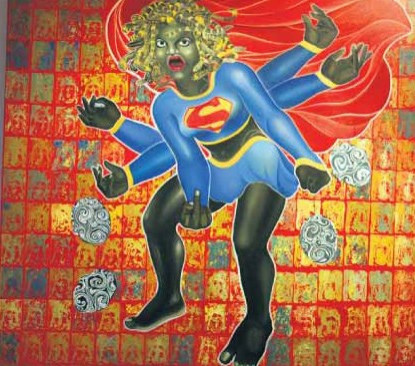Superman As Hindu God? Another East-West Culture Clash

In yet another example of an East-West clash in an increasingly globalized world, British actor Henry Cavill, star of the hugely successful new film “Superman,” has offended some Hindus by comparing the Man of Steel with the various gods of Hinduism. “India has a rich mythology, and they're [Superman and Hindu mythology] both rooted in the same thing -- hope and goodness," Cavill said during a promotional event, the Times of India reports.
Despite Cavill's seemingly good-natured comment, some Hindus took offense, suggesting he was (unwittingly) trivializing and exoticizing their ancient faith. Rajan Zed, a Hindu activist in the U.S., said in a statement that Superman at the most was a cultural icon, while God produced and sustained the world and was the source of being and life.
“We offered prayers to our deities and worshipped them,” Zed, president of the Universal Society of Hinduism, said. “It was insensitive for Cavill to drag them in comparison with an earthly character, thus hurting the feelings of the devotees.”
But amazingly, this is not the first time that Superman has been conflated with Hindu deities. In late 2012, a Nepalese cartoonist named Manish Harijan ran afoul of Hindu fundamentalists by equating the American comic book superhero with Hindu gods in his work. In fact, Harijan faced charges of blasphemy and even death threats from members of the World Hindu Federation, or WHF, who condemned his “outrageous portrayals” of Hindu gods mixed with images of Western superheroes the Ghost Rider and Superman at the Siddhartha Art Gallery in Kathmandu.
For example, one painting titled “The Ghost Rider in Buddha” depicted the Buddha with a torch in flames released by the Ghost Rider’s skull. Another image, called “Super Nataraj,” portrayed Lord Shiva wearing Superman’s costume, carrying both a lotus flower and a pistol. “This is just a portrayal of Western influence in Eastern culture,” Harijan said at the time. “There is nothing to be offended about it.”
Hem Bahadur Karki, a member of the WHF and a former colonel in the Nepali army, clearly disagreed, filing a lawsuit to shut down the exhibit. “The way our gods have been depicted is totally offensive,” Karki said in his legal brief, citing, among other things, that the portrayal of the Hindu goddess Kali in miniskirts and the Monkey god Hanuman carrying a bottle of alcohol was tantamount to “abuse of freedom of expression.”
However, these issues are part of a much larger palette, the seemingly endless episodes of westerners misunderstanding or misinterpreting India’s cultural idioms – and the resentment that causes within Indians (even for things that are rather trivial).
For example, the aforementioned Zed recently condemned American actress-singer Selena Gomez for wearing a bindi on her forehead in a music video. "The bindi on the forehead is an ancient tradition in Hinduism and has religious significance. It is also sometimes referred to as the third eye and the flame, and it is an auspicious religious and spiritual symbol," Zed said. "It is not meant to be thrown around loosely for seductive effects or as a fashion accessory aiming at mercantile greed. Selena should apologize, and then she should get acquainted with the basics of world religions," he added. Many other Western celebrities, as well as some corporations, have been similarly criticized by Hindus for co-opting and corrupting Hindu symbols.
In a blog for Browngirl magazine, Foram Mehta wrote that incidents like this reflect Western “condescension” toward Hinduism. Reflecting on experiences in her childhood in the U.S., when she was usually the only Indian child in her school classes, she noted how her American peers regarded Hinduism as something strange and bizarre and not to be taken seriously.
“This was an experience I dealt with many years ago, and interestingly enough many Hindus are still dealing with today: the misrepresentation and subsequent belittlement of Hinduism,” Mehta wrote. “For a religion as established and tolerant as Hinduism, it is disrespected in the West through other outlets than just public education. Through media and marketable fashions and trends, the face of Hinduism becomes no more than what is represented by many in the West, a ‘mythological,’ pagan religion.”
Mehta objects to how the texts of Hinduism are characterized by Western scholars as “mythology." “This is by far one of the most insulting descriptions to characterize the religion with,” she noted. “In reality, all religions are theoretically mythological because no one religion can prove its validity. Can Christians prove that the word of the Bible comes directly from God? Can they prove that the world was created in seven days? No, but even so, Christianity’s core beliefs are rarely described as myths.”
But Mehta does not think Cavill meant any harm by his remarks about Superman and Hindu gods. “I think the problem lies in the fact that people, both Indian and Westerners, have perpetuated the image of Hinduism being rooted in mythology that it's just so easy to assume it's an extravagant story, she told the International Business Times.
“[Cavill’s] comment was meant in good intention, and I think, if anything, he was trying to make a point to say that Hinduism is rooted in goodness and hope. His choice of words were poor, but I don't think they meant any harm. At the end of the day, we must look past people's words and how they use them and accept what their intentions are behind them. I think he meant very well.”
© Copyright IBTimes 2024. All rights reserved.





















